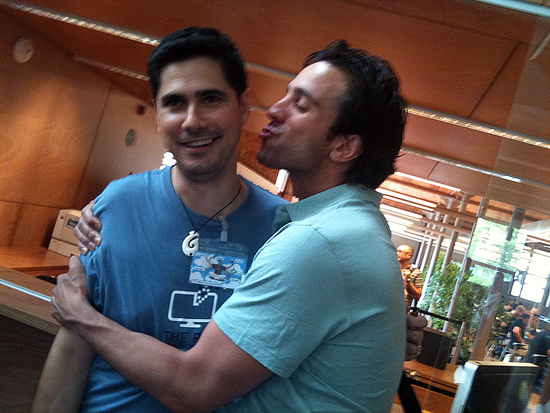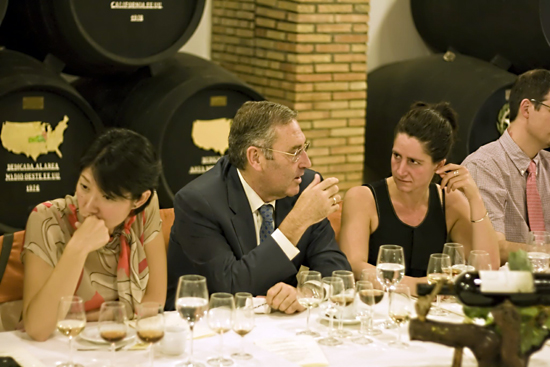Culture and Society: Greetings and Courtesies
General
The Spanish are a warm and friendly people, and greeting others is seen as an essential part of maintaining good relationships. Greetings are offered not only to friends and business associates, but often to complete strangers that one encounters in passing.
Spaniards stand and sit very close to each other, using expressive hand and arm gestures. The concept of "personal space" is very limited, and people often interrupt each other.
Informal Greetings
Spaniards use informal greetings with family, close friends, and young people, as well as those of equal social status in a casual setting. When entering a group, Spaniards greet each person individually. Men typically shake each other's right hands, grasping each others' forearms with the left hand as they do so. Direct eye contact is expected. If they are especially close, this may evolve into an abrazo (hug) or a kiss next to each cheek. Women place their cheeks together and kiss the air, once on each side, beginning with the left. Men greet women in the same manner that women greet each other.
During informal greetings, Spaniards use the familiar tu ("you," singular) or vosotros ("you," plural) and their corresponding verb forms. Using someone's given name is the norm, usually the first of a Spaniard's two given names. The country's strong Catholic tradition is evident in the very popular names, María and José, which may be given to a child of either gender; if a child receives the name of the opposite gender, however, it appears as the second given name and is either ignored or shortened. For example, a boy named Juan María would be called Juan.
Informal greetings usually begin with Hola (Hi), ¿Qué pasa? (What's happening?), or ¿Qué hay? or ¿Qué tal? (What's up?), followed by questions about one's well-being, health, and family. ¿Cómo estás? (How are you?) follows next, to which the usual response is Bien. ¿Y tu? (Well. And you?).
If meeting someone for the first time in a very casual situation, Spaniards introduce themselves with Me llamo ___ (I am called ___) and ask, ¿Cómo te llamas? (How are you called?). Both parties then comment, Mucho gusto (Much pleasure).
When taking leave, Spaniards repeat handshakes or kisses with each person, saying Hasta luego (Until later), Hasta la vista (Until we meet again), Hasta mañana (Until tomorrow), or Adiós (Goodbye).
Formal Greetings
Spaniards use formal greetings for strangers, elders, those of higher social rank, and the general public whom they pass in the street. Initial greetings in formal situations typically involve a handshake and direct eye contact for both men and women, but may include grasping of the arm or cheek kisses once a relationship has been established.
In formal greetings, Spaniards use the polite usted (you) and its corresponding verb forms. The honorifics Señor , Señora , and Señorita are commonly used before someone's surname to show respect, and may be replaced by a title when applicable. For example, a professor named Diego Felipe Rodriguez would be addressed as Señor Rodriguez or Profesor Rodriguez. A move to first names is generally only suggested after strong personal relationship has been established, and then only by the person of higher social rank or older age.
Formal greetings usually begin with an appropriate benediction for the time of day, including Buenos días (Good morning) and Buenos tardes (Good afternoon). Following this, Spaniards utter the more polite, ¿Cómo esta usted? (How are you?), to which the other replies, Muy bien, gracias. ¿Y usted? (Very well, thank you. And you?).
Introductions are usually made by a third party in formal milieu, but if not, a Spaniard may extend a hand and say, Me llamo ___ (My name is ___), followed by the polite, ¿Cómo se llama Usted? (How are you called?). Upon learning each others' names, both parties say, Encantado de conocerle (Enchanted to meet you).
When the time comes to depart, Spaniards greeat each person present again, wish them a pleasant day or evening, and express pleasure at the encounter with, Fue un placer conocerle (It was a pleasure to meet you) or, Fue un placer verle (It was a pleasure to see you).
Business Greetings
Business greetings follow the norms for formal greetings, with an added emphasis on respect and titles. Common business titles include Doctor/Médico (Doctor), Abogado (Lawyer), Arquitecto (Architect), Ingeniero (Engineer), Director Ejecutivo (CEO), and Gerente (Manager).
The Spanish are highly relational, so many first meetings include a great deal of conversation designed to get to know the people involved. This initial feeling-out period is crucial, as it often determines whether or not the participants are comfortable enough to do business together.
Business cards are an important part of business greetings. Spaniards hand the card to the receptionist in an office building as part of their introduction. When greeting a potential client, a businessperson tends to hold the card in his palm of his or her right hand, then extend that hand for a handshake. The other person grasps the card as the handshake is released. Spaniards appreciate it when foreign businesspeople translate their cards into Spanish on one side, and present it with that side facing up.
Conversation Topics
The Spanish love to talk and can maintain a conversation for hours. This practice of lengthy chatting is called tertulia and often involves several people talking at once and interrupting each other at will.
One of the more popular topics is family. However, unless the relationship between the speakers is very close, personal problems within the family are kept private. Another frequent topic is food. Spaniards take great pride in their cuisine, especially local products such as their world-famous wines, hams, and cheeses, or homemade specialties like aioli.
Taboos
Religion and politics are generally avoided in polite conversation, as either stirs up controversial and possibly strong feelings. Certain history subjects, such as the Spanish Civil War and Franco, are avoided, as many families had relatives on opposite sides of the war.
Calling someone by his or her first name without being invited to do so is considered presumptuous and rude.
Article written for World Trade Press by John E. Roper.
Copyright © 1993—2024 World Trade Press. All rights reserved.

 Spain
Spain 

